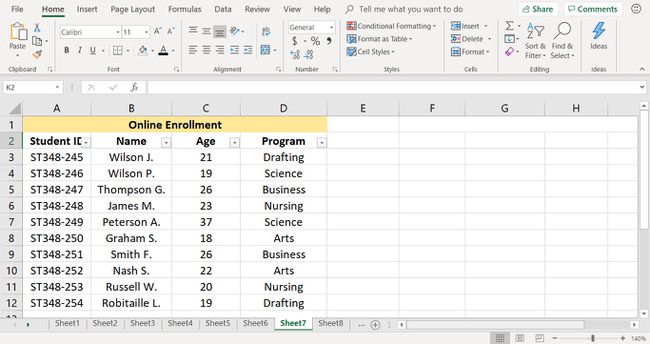5 Ways to Quickly Locate Data in Excel Sheets

Navigating through extensive datasets in Microsoft Excel can feel like an expedition through dense woods. Without the right tools or techniques, finding your desired data might be an exhausting endeavor. However, Excel offers various methods to swiftly locate and manipulate information within its sheets, making the journey much more manageable. Let's delve into five efficient strategies to quickly find what you need in Excel.
1. Use of Filters

Filters are perhaps one of the most straightforward tools to locate specific data. Here’s how you can apply filters:
- Select the header row where your data starts.
- Go to the Data tab and click on Filter. This will add dropdown arrows next to each column header.
- Click the arrow in the column you want to filter, and choose from various filtering options like sorting, text filters, or number filters.
🗒 Note: Remember to clear filters when you no longer need them to avoid confusion with subsequent data analysis.
2. Conditional Formatting

While not a direct method for data location, conditional formatting can highlight data based on conditions, making it visually easier to locate:
- Select the range or column you wish to analyze.
- Go to Home > Conditional Formatting > New Rule.
- Choose a rule type like “Format only cells that contain” and set your conditions.
The cells meeting your criteria will now stand out with a different formatting, allowing for quick visual identification.
3. Excel’s Search Function

Excel’s built-in search tool, often underestimated, can be your quickest route to locating data:
- Press Ctrl + F or go to Home > Find & Select > Find.
- Type in your search term. Use options like Match case or Find entire cells only for precise searches.
- The Find All button will list all occurrences, which is particularly useful for repetitive data analysis.
4. Use of VLOOKUP, INDEX, and MATCH

For those familiar with Excel formulas, functions like VLOOKUP, INDEX, and MATCH can streamline data retrieval:
| Function | Usage |
|---|---|
| VLOOKUP | =VLOOKUP(lookup_value, table_array, col_index_num, [range_lookup]) |
| INDEX | =INDEX(array, row_num, [column_num]) |
| MATCH | =MATCH(lookup_value, lookup_array, [match_type]) |

These functions are potent when you know what to look for but not where it is. They can pinpoint exact locations or return corresponding values from different columns.
💡 Note: VLOOKUP searches for values in the leftmost column of your data set, which might limit its application in some cases.
5. Advanced Filter

When standard filters don’t cut it, advanced filters provide more sophisticated data manipulation:
- Go to Data > Advanced. Specify the list range and criteria range.
- Using advanced filters, you can perform complex filtering operations or even copy unique values to another location.
💻 Note: Advanced filtering is an Excel-specific feature, making it less versatile than other methods when transferring data between different applications.
Final Thoughts

Excel’s vast array of tools offers numerous ways to quickly locate data, making it an invaluable asset for anyone dealing with large datasets. From simple filters to advanced functions like VLOOKUP, each method serves different needs, from visual cues to exact data extraction. Understanding these techniques can drastically reduce the time spent on data analysis, improving productivity and accuracy. Remember to tailor your approach based on the complexity of your data and the specific task at hand.
Can I use filters on my mobile device?

+
Yes, you can apply filters in Excel for mobile devices. The process is similar to the desktop version, accessible through the Data tab or equivalent menu.
What are the limitations of VLOOKUP?

+
VLOOKUP has limitations like only looking up values to the right, which can make it less flexible for certain data structures. It also struggles with case-sensitive lookups unless configured to do so.
How can I remove filters to see all my data again?

+
To remove filters and display all data, go to the Data tab and click on Filter. This toggles the filter off, returning your data to its original state.
Is there a way to find data across multiple sheets?

+
Yes, you can use a combination of VLOOKUP or INDEX/MATCH with 3D references in Excel to search data across multiple sheets. However, this requires setting up your sheets correctly.
Can I use conditional formatting on charts in Excel?

+
No, conditional formatting is applied directly to cell data, not charts. However, you can use other chart customization options to achieve a similar visual effect.



